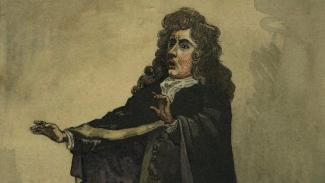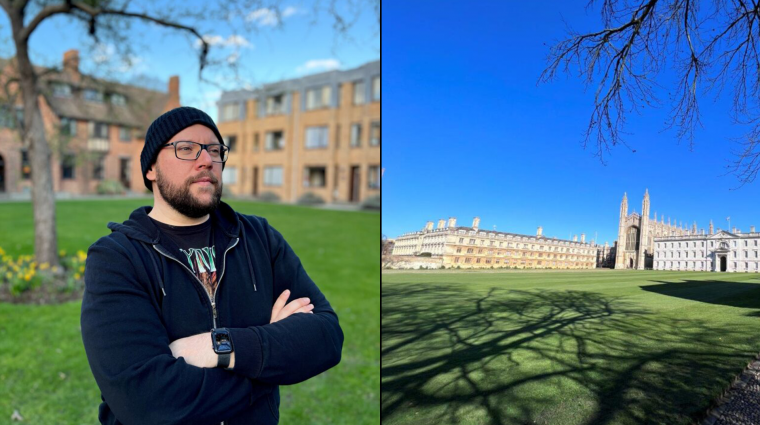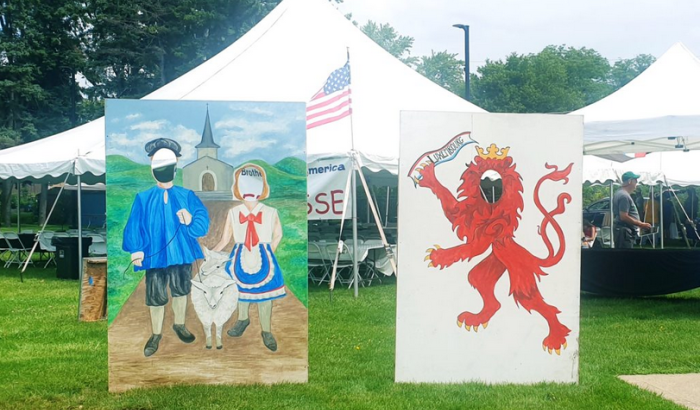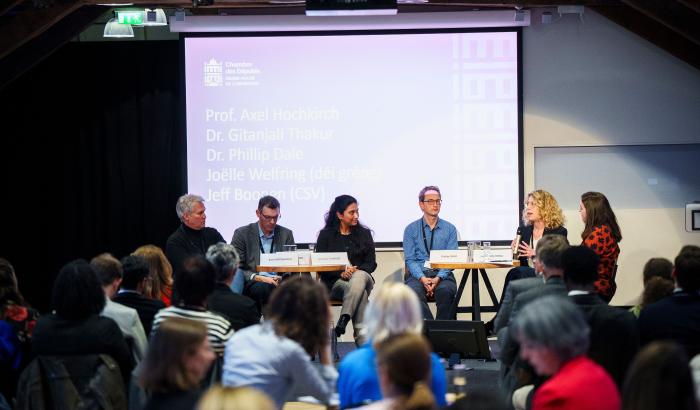
© LUNA Folger Digital Image Collection
An illustration of Thomas Betterton, the most famous actor in the age of Restoration, playing Hamlet
As one of the most important poets of all time William Shakespeare keeps researchers busy worldwide. One of them is the Luxembourg national Claude Fretz.
He came to Britain in 2008, to study English at Royal Holloway, University of London. Originally, the plan was to return to Luxembourg and become a teacher, but Claude Fretz supposes that he caught the Shakespeare bug at some point during his undergraduate studies – and so he stayed in the UK. Now the Luxembourgian is a Research Fellow at Queen’s University Belfast, still dealing with Shakespeare.
Claude, you are currently working on the project ‘Performing Restoration Shakespeare’. What is this about?
The term ‘Restoration’ refers to the restoration of the English monarchy in 1660, which ended a period of republican government, the so-called ‘Commonwealth’, that had started with the execution of King Charles I in 1649. The project ‘Performing Restoration Shakespeare’ examines the performance of Shakespeare’s plays during this time (1660-1714). Importantly, though, we do not only investigate how and why Restoration adaptations of Shakespeare succeeded in performance in their own time, but also how and why they can succeed in performance today ‒ and we do this in collaboration with actors, directors, and musicians.
What is the difference between the performances of Shakespeare works of the Restoration and the original performances?
One fascinating thing about the Restoration is that this was the first time in almost 20 years that theatres opened to the public again ‒ they were closed between 1642 and 1660 And when the theatre companies staged Shakespeare’s works, they changed pretty much everything.
Perhaps the most seminal change that came about at this time was the introduction of female actors. Whereas in Shakespeare’s time, boy actors had been used for female roles, actresses now did not only perform female parts, but were sometimes recruited even to perform male roles. And the indoor theatres of the restoration were also much more technically advanced and sophisticated than the theatres in Shakespeare’s time around 1600.
In what way?
They were equipped with moveable scenery, for example, and with machines that allowed for effects like onstage flying, for which ropes and wires were used. Song, music, and dance also featured much more prominently in Restoration performances, which are therefore sometimes referred to as ‘semi-operas’ or ‘dramatic operas’ ‒ and that is why our project team also includes a musicologist.
Were the contents of Shakespeare’s works also changed?
Absolutely! For a start, the changed political situation made it necessary for Shakespeare’s plays to be substantially rewritten. In The Tempest, for example, the threats of usurpation and rebellion against a sovereign were muted or defused; and Richard III was reframed as a tragicomic story about a failed Commonwealth tyrant. Indeed, most of Shakespeare’s history plays and Roman tragedies were converted into more or less conspicuous political commentaries.
So there was an adaptation to the political situation…
Yes, but not only that. The new tastes and expectations of Restoration theatregoers also demanded tragicomic plots, increased sentimentalism, and poetic justice. King Lear, for example, now survived.
Restoration playwrights also rewrote much of Shakespeare’s figurative and ambiguous language to make it clearer and more intelligible; and alterations were made in order to accommodate more songs and music and to add new female roles ‒ Miranda in The Tempest now had a sister..
Is the benefit of this project purely scientific or is it also useful for artistic actors?
Artists and the general public are at the heart of our research project, because, above all, we want to enhance artistic and public understandings of Restoration Shakespeare. We do this through a series of public engagement events, workshops, and public performances, including a production of Macbeth at the Folger Theatre in September.
Indeed, one of the great things about this project is that we get to work with the world's leading institutions dedicated to the academic and public understanding of Shakespeare: Shakespeare’s Globe in London, the Shakespeare Birthplace Trust in Stratford-upon-Avon, and the Folger Shakespeare Library in Washington, DC.
And how will it continue?
Our long-range goal is to make Restoration versions of Shakespeare attractive to 21st century theatres and audiences. So we hope that our work will widen the range of theatrical experiences available to the public.
Find out more about Claude Fretz and the project Performing Restoration Shakespeare
Interview: Uwe Hentschel, Claude Fretz
Illustration © LUNA Folger Digital Image Collection
Infobox
Neben dem Forschungsprojekt arbeitet Claude Fretz gerade an einem Buch, das auf seiner Doktorarbeit basiert und in dem er darlegt, wie Shakespeare in seinen Stücken Träumereien und Schlaf verwendet. Zu diesem Zweck erforscht der Literaturwissenschaftler, wie Träume und Schlaf im 16. und frühen 17. Jahrhundert verstanden wurden.
„Dank Freud verbinden viele von uns Träume mit dem Unterbewusstsein. Aber zu Shakespeares Zeit existierten diese Ideen natürlich noch nicht. Im frühneuzeitlichen England konnten Träume nicht nur körperliche oder geistige Ursprünge haben, sondern sie konnten auch durch Umweltkräfte - einschließlich der Sterne und der Jahreszeiten - oder durch Gott, Engel oder Dämonen erschaffen werden“, erklärt Claude Fretz. „Aufgrund dieser verschiedenen Möglichkeiten waren die Bedeutungen und Ursprünge von Träumen höchst unsicher. So konnten Träume im Grunde alles bedeuten. Für Shakespeare und andere Dramatiker eröffnete diese Ungewissheit alle möglichen faszinierenden dramatischen Möglichkeiten.







